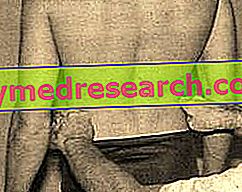Definition
Anxiety, that irrational intertwining of fears and tensions, is an almost "physiological" phenomenon among the population of Our Days; anxiety is nothing less than a psycho-physical tension that, more often than not, has its roots in the irrational. Sometimes, however, anxiety has a very precise basis, and grows from the desire to overcome an obstacle which, in the eyes of the affected individual, seems insurmountable.
Causes
As mentioned, anxiety can have an unknown irrational nature, or it can be addressed against a known and precise external stimulus. Anxiety becomes pathological when it is such as to alter the psychic balance of the affected individual, who, seeing no way out, tends to isolate himself from others. Anxiety is strongly influenced by the genetic component and biological elements (hyperproduction of norepinephrine, hypoproduction of GABA and serotonin).
Symptoms
Anxiety is a purely subjective condition, therefore the intensity of the symptoms and the severity of the problem are extremely variable. The person suffering from anxiety is uncertain of the future, fears imminent danger, tends to lose control of himself and emotions; he is often overly concerned and inattentive. This is associated with physical disorders: dry mouth, difficulty swallowing, diarrhea, dyspnoea, insomnia, feeling of suffocation, fatigue, muscle tension, tremors, hot flashes.
Natural Care
Information on Anxiety - Medications for the Treatment of Anxiety is not intended to replace the direct relationship between health professional and patient. Always consult your doctor and / or specialist before taking Anxiety - Anxiety Medications.
drugs
In general, anxiety is a symptom of complex pathologies such as depression, sexual disorders, schizophrenia; in similar situations, the treatment of the underlying disease will also carry away the disorders associated with the anxiety syndrome. In general, there are two possible therapeutic approaches for the treatment of anxiety: pharmacological treatment and psychological counseling; in most patients suffering from severe anxiety (anxiety that hinders the subject's simple social-work activities), the combination of both treatments is recommended in order to limit the recovery time from the disease.
It should be pointed out that psychological therapy has a positive effect only if the patient cooperates with will power; an obstacle that many psychological therapies have in common is in fact represented by the skepticism of patients in dealing with care; consequently they do not respond appropriately to the proposed therapy.
Anxiolytic drugs are quite powerful: these act directly on the problem, but involve many side effects, even if they are rather serious (eg dependence). It is therefore recommended not to exceed the doses and to comply with the methods of administration prescribed by the doctor.
The categories of drugs most used in therapy for the treatment of anxiety are: anxiolytics, benzodiazepines, antidepressants and antihistamines.
Anxiolytics :
- Buspirone (eg. Buspimen, Buspar): the drug is a NON-HYPNOTIC anxiolytic widely used in therapy for the treatment of medium and severe CHRONIC anxiety; it is a partial agonist of the serotonin receptors with delayed action (this explains the reason why the drug is indicated only for the treatment of chronic anxiety). The drug can also be used for long periods, since it generates neither dependency nor tolerance. It is recommended to start therapy with a dose of 7.5 mg, taken by mouth, twice a day; alternatively, take 5 mg of active, three times a day. The maintenance dose can increase by 5 mg (compared to the initial dose), every 2-3 days, up to a maximum of 20-60 mg a day, to be divided into several doses during the day.
Benzodiazepines : benzodiazepine intake should be moderate; all drugs belonging to this category are addictive and addictive. Furthermore, it has long been known that the treatment with benzodiazepines must not be stopped abruptly, in order to avoid the rebound effect. Benzodiazepines are also widely used to treat insomnia (they are hypno-inducing drugs) and in epilepsy (due to their marked muscle relaxant activity). Some of the many benzodiazepines used in therapy are:
- Diazepam (eg. Micropam, Ansiolin, Valium, Diazemuls, Diazepam FN): it is recommended to start therapy for anxiety with a variable dose of 2 to 10 mg, to be taken 2-4 times a day, based on severity of the condition. It is also possible to take the drug intramuscularly or intravenously: 2-5 mg are indicated for the treatment of mild or moderate anxiety, while in case of severity it is recommended to administer 5-10 mg of active. If necessary, repeat the administration every 3-4 hours. Diazepam is also available in combination with octatropin methyl bromide (Valpinax): in this case, the drug is prescribed to treat spastic pain at the gastrointestinal level in the context of the anxiety syndrome.
- Alprazolam (eg Xanax, Frontal, Alprazig): particularly indicated for the treatment of anxiety associated with panic attacks. Its use can be prescribed by the doctor only in case of confirmed diagnosis of the severe anxiety syndrome: this benzodiazepine, in fact, creates more dependence than the other drugs belonging to this pharmaceutical class. Take an active dose of 0.25-0.50 mg, orally, three times a day. The dose can be increased gradually every 3-4 days, as needed. The maintenance dose should not exceed 4 mg per dose. Consult your doctor.
- Lorazepam (eg. Control, Tavor, Zeloram, Lorans): the drug should be taken orally with an initial dose of 1 mg, 2-3 times a day. The maintenance dose - however variable according to the severity of the condition - is 1-2 mg, 2-3 times a day. The daily dosage can vary from 1 to 10 mg. The drug can also be taken intravenously (2 mg or 0.044 mg / kg). Consult your doctor.
- Clonazepam (eg Rivotril): indicated for the treatment of anxiety associated with panic attacks. It is recommended to start therapy with 0.25 mg of drug a day. The dose can be increased by 1 mg per day, after 3 days of treatment. Do not exceed 4 mg per day.
Antihistamines : these drugs, although less used in therapy to treat anxiety, can sometimes accelerate healing.
- Hydroxyzine (eg Atarax): in the context of anxiety, the antihistamine drug relieves the symptom (it does not act directly on the cause); it is used in therapy also as an adjuvant in organic diseases associated with anxiety. For this purpose, it is recommended to take a dose of drug varying from 50 to 100 mg, orally or intramuscularly, 4 times a day. The drug is widely used in therapy to treat urticaria.
In the past, barbiturates were used to treat anxiety, hypnotic drugs and first-generation sedatives; currently, these assets are no longer used for this purpose because they have too low a therapeutic index, therefore they are too dangerous.
Beta blockers : beta blockers are an aid to reduce secondary symptoms associated with anxiety; in other words, these active ingredients do not act directly on the primary symptoms that accompany the anxious syndrome (tension, worry, uncertainty, fear, etc.), rather they calm the physical signs, such as tremors, tachycardia, palpitations. Beta blockers are not indicated for all patients experiencing anxiety; their medical use is reserved for those patients whose control of somatic symptoms can prevent the onset of anxiety. These drugs do not affect the psychological component of anxiety.
- Propranolol (eg. Inderal): it is recommended to take 40 mg of the drug once a day; it is possible to increase the dosage up to 40 mg, three times a day. Consult your doctor.
Other anxiolytic-antipsychotic drugs :
- Meprobamate (eg. Quanil): it is a psychopharmaceutical (class of belonging: uretani) used as an anxiolytic, widely used in the past for the treatment of anxiety and as a tranquilizer in general. Currently, its use is infrequent, because it is replaced by benzodiazepines; in fact, the drug is less effective than the latter, in addition to being more dangerous. The drug tends to induce more dependence than benzodiazepines. However, the dose, indicatively, is 400 mg, to be taken 3-4 times a day, orally. The recommended dose for the treatment of anxiety in the elderly is half.
- Pregablyn (eg Lyrica): in addition to the treatment of epilepsy, this drug is widely used in therapy to treat generalized anxiety, as well as linked to chronic stress or work-related nervousness. It is recommended to start therapy with 150 mg of active per day, divided into 2-3 doses. After a few days (3-7) it is possible to change the dose, and increase it up to 300 mg / day. For the maintenance dose: do not exceed 600 mg per day. Stopping treatment with this drug should be done gradually. Consult your doctor.
- Paroxetine (eg Sereupin, Serestill, Eutimil, Daparox): the drug is a selective serotonin reuptake inhibitor, particularly indicated for treating generalized anxiety. Indicatively, it is recommended to start therapy with a dose of 20 mg / day, which can be increased up to 50 mg per day (it is possible to increase the dose by 10 mg every 2-3 days, depending on the response) . To treat generalized anxiety in the elderly, do not exceed 40 mg a day.



